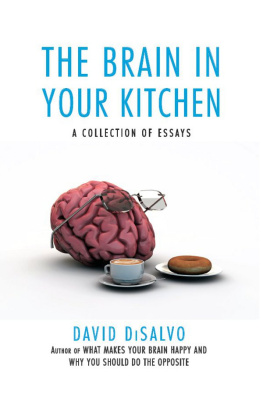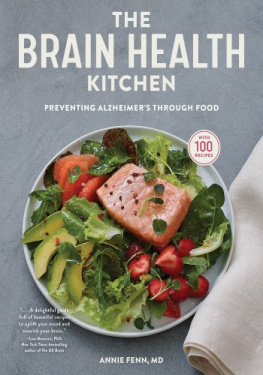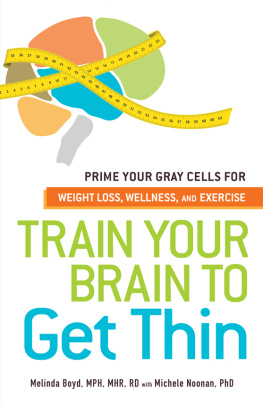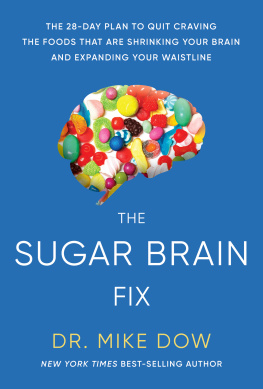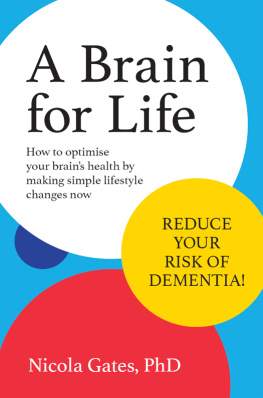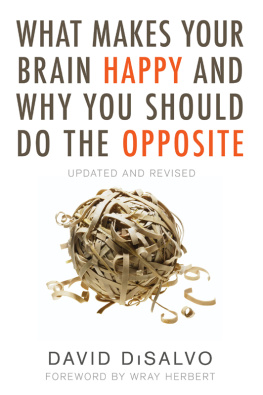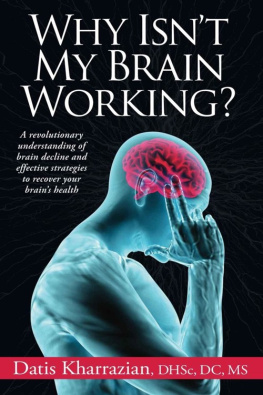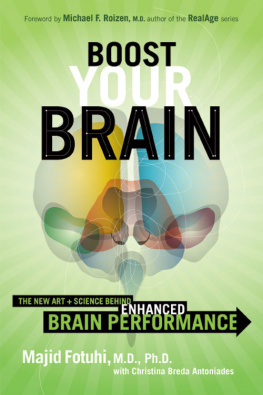All rights reserved. No part of this book may be used or reproduced in any manner whatsoever without written permission except in the case of brief quotations embodied in critical articles or reviews.
BenBella Books, Inc.
10300 N. Central Expressway
Library of Congress Cataloging-in-Publication Data is available for this title.
The brain is a wonderful organ. It starts working the moment you get up in the morning and does not stop until you get into the office.
Robert Frost
The brain is indeed a wonderful organ, as the inestimable Mr. Frost tells us, but its also the most enigmatic part of us. In turns, its our closest ally or our worst enemyour greatest guide or a nefarious tool of misdirection.
One thing we can say for sure about the brain: it means well. From an evolutionary perspective, our brains are a success; we wouldnt be here if they werent. And this success is derived from a litany of adaptations that make us what we aresurvival machines, genetically complemented with the neurochemical means to prepare for threats and identify rewards ripe for pursuit, and the ability to learn from our environments from birth until we make our final exit.
Heres the problem: all of those incredible adaptations, essential though they are, dont always fare so well in our consumerist cultures. Daily, were faced with choices about what to eat, buy, wear and own, and too often our brains wander in and out of these decisions like an over-eager kid at a theme park.
We dont really see all the facets of these decisions. All of us are to a degree blinded by a tsunami of informationsome good, some bad, some intentionally misleading. We live in a time when its not a no-brainer (if youll excuse the pun) to distinguish marketing from education. Ironic that our brainsmarvelous instruments of our survivalcreated cultures that foster a marketplace masquerade.
This e-book aims to wedge itself between good and bad information, particularly when it comes to the sorts of things we buy, the foods we eat, the medicines and supplements we take, and the marketing messages were deluged by every time we step into a store (whether made of bricks and mortar or pixels).
Its also designed to introduce you to a few factseach grounded in credible researchabout how certain things we eat, drink, and are exposed to affect our brains. These findings come from the leading edge of science studies, and in many cases are tremendously useful.
In essence, this is a takeaway book, because it has been written for you to take away information and make use of it in your life. I hope you enjoy the read.

Few dietary items over the past few years have come under as much scrutiny as gluten, though lately that scrutiny is morphing into something resembling a full-blown health panic. Anytime this sort of public drama unfolds, Im forced to wonderare we sure we understand what were panicking about?
Of particular intrigue is what research is, and is not, revealing about glutens effect on the brain, and whether the general gluten-eating publicthose not diagnosed as gluten intolerantshould be concerned.
I want to address those questions, but first tackle something a bit more basic: what exactly is gluten and why is it in our diets?
Gluten is a protein found in wheat, barley, and rye (the wheat version gets most of the attention in American diets). Latin for glue, gluten gives elasticity and shape to dough, and is used as a meat substitute around the world (you might consider it the grain version of tofu). Because its a cheap way to add protein to almost anything lacking it, and because it improves food texture and chewiness, gluten has become a staple additive in more foods than we realize. Its also commonly used in medicines, vitamins, and adhesives.
So why is this grain-based protein such a big concern?
Lets start with what we know for sure. A relatively large percentage of the population has a physical sensitivity to gluten resulting in unpleasant digestive symptoms. We dont need to roll out all the details here, but if youre gluten-sensitive and eat just about anything down the bread, cracker, or cookie aisles, youre not going to have a great night. The exact number of Americans who fall in this category isnt known, but some estimates put it as high as 20+ million.
Since our diets are full of things that can cause digestive issues (fats, oils, dairy products, etc.), many people dont realize that they are gluten-sensitive. And then there are varying degrees of sensitivity, which makes narrowing down precisely whats bringing on the abdominal cramps and associated symptoms all the more difficult.
A smaller percentage of the population suffers from a more serious, genetic form of gluten intolerance called celiac disease, in which the body responds to gluten exposure by damaging the small intestine. This is a dangerous autoimmune condition that can result in permanent intestinal damage and a range of other problemsand unfortunately requires complete abstinence from gluten to remedy, something not easily accomplished. Its possible that as many as 2.5 million Americans have celiac disease, but most have not been diagnosed because the disease typically goes undetected for years.
Because gluten exposure damages the small intestine in those with celiac disease, causing nutritional deficiencies, research has revealed that multiple parts of the body can be affected, including the brain. This makes sense, since most nutritional absorption occurs in the small intestine. If your brain isnt receiving adequate B-6 and B-12, for example, its likely that youll experience lack of mental claritysomething celiac sufferers often describe as a brain fog.
Studies have linked gluten exposure in celiac patients with higher incidences of migraines, brain lesions, epilepsy, dementia, and learning disorders. The effects are most severe in children, but the studies identify neurological issues in virtually every age group. According to the Center for Peripheral Neuropathy, about 10 percent of celiac patients develop neurological symptoms.
All of that is well established, but from here the evidential waters get murkier.
The question is does gluten induce neurological symptoms in non-celiac sufferers? Some argue that anyone with gluten-sensitivity, no matter how moderate, is at risk from a trip to the neighborhood grocery store. Some (such as The Gluten Free Society) argue that gluten is a potential neurotoxin that anyone with gluten sensitivity needs to rid their pantry of immediately or sooner.
The research supporting these claims isnt terribly clear. In the my study is better than your study ping pong match of nutritional science, theres research available to support moderate and extreme positions on gluten intolerance, but nothing yet conclusive enough to nail the grain protein to its cross.

